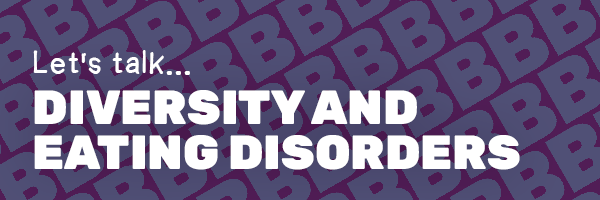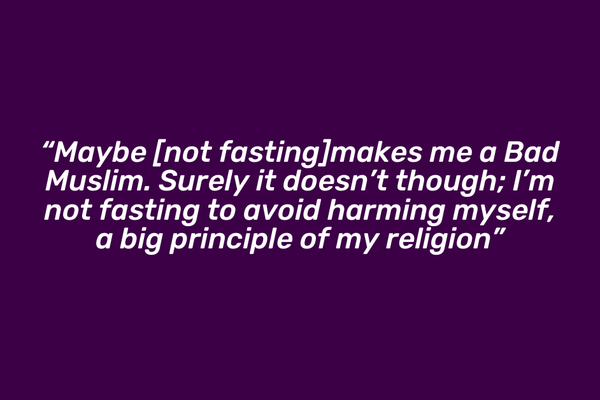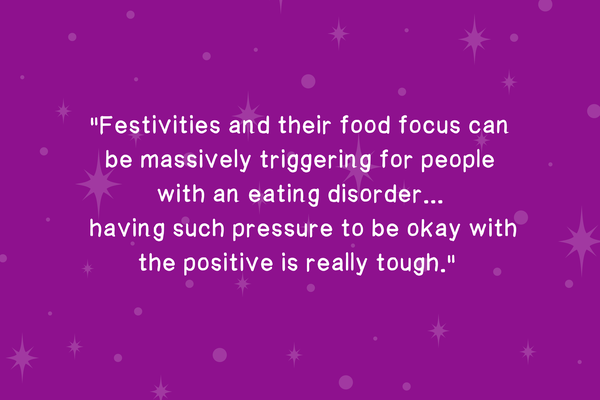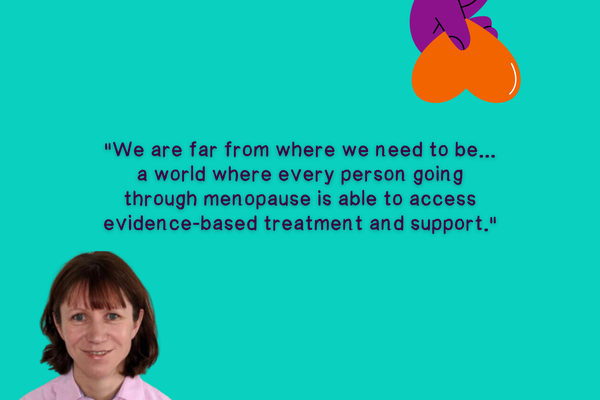We're still reeling from all the fascinating conversations that took place at our recent online event on Eating Disorders & Diversity - hosted by Dr Sheryllin McNeil and featuring previous service users and peer support workers.
Here are 5 top things we learnt from the panel's discussions....

"Differing cultures and family set ups need to be taken into account to help aid recovery"
There are a number of cultural differences which mean families from marginalised groups may face extra barriers when it comes to caring for their loved one in recovery. One example given by speaker Jaz was around recovery meal plans provided by their support services - recipes included in her plan were for typical Western cuisine, totally different to her family's usual South Asian style cooking, creating an added potential barrier in their ability to her aid her recovery.
Language barriers may also prevent adequate access to proper treatment. Sufferers coming from second generation immigrant families may feel an added burden in having to educate their families about their diagnosis and treatment process - taking on 'almost in a dual role' in the words of Sheryllin, and likely having an impact on their ability to focus on recovery. Providing translation services and ensuring resources such as leaflets are available in multiple languages may seem like a small factor, but can have a huge impact when it comes to successful treatment.
"Age can often be overlooked as a factor when it comes to eating disorder treatment"
As speaker Tori reminded us, older sufferers may also have an expectation 'to have themselves together' which can mean they may be less likely to reach out for support in the first place: older people can feel like an eating disorder is something they 'shouldn't' be suffering from at a later stage in life. It's important we remember that of course this is not true - anyone, at any life stage, could develop an eating disorder, and age shouldn't be a barrier to them receiving treatment. "Control is more often than not a large factor when it comes to eating disorders" pointed out Tori, and people can go through things at any age which might make them more susceptible to developing an eating disorder due to a feeling of lack of control.
While early intervention and work being done in schools, university's and other youth settings is incredibly important, we shouldn't forget about other settings where people of other ages struggling with an eating disorder can be more easily reached.
"We still have more work to do in spreading the message that eating disorders don't only affect women"
The panel discussed the continuing struggle to get men 'through the door' when it comes to eating disorder support. Reasons for this come from multiple angles - both from lack of understanding from some clinicians and wider society, and from sufferers themselves. As speaker Thomas reflected, "it probably took me a lot longer to ask for help, and then receive help, because the idea of me as a man having an eating disorder was not even on anybody's radar".
A lot of men may still come up against feelings of embarrassment or ignorance when it comes to seeking support - the pressure to not be seen as 'weak' when it comes to seeking help is a barrier still to be removed in order to help men get the support they deserve .
"Trust is a huge element when it comes to improving uptake in eating disorder treatment for marginalised communities"
Marginalised groups including those in the LGBTQ+ community may already been less likely to seek support for fear of misunderstanding or mistreatment. The panel discussed how a positive way to help build this trust could be to ensure support is person-led, building relationships so that the sufferer feels safe and supported, and is able to open up conversations in a sensitive way. "There's a piece of work to be done even before people approach services to help communicate that they are indeed safe spaces" suggested Sheryllin.
"Even seemingly small things can make a big difference when it comes to representation"
When it comes to representation, it can make a huge difference for people from marginalised groups to see people that look like them - whether that's in terms of race, body type, age or any other factor. '"As a child, all you want to do is fit in, and in movies all the popular kids are skinny and white… seeing that can really affect you", reflected speaker Anjai. The panel suggested adequate representation should also be considered when it comes to support - for example making an effort to ensure any photography featured in resources includes a wide range of body types, races, gender presentation etc. This may seem like a simple consideration, but can make a huge difference to people considering reaching out for support.
If you've been affected by any of the issues raised in this blog, or are concerned for yourself or a loved one, you can find support and guidance on the help pages of our website.
Help us change more lives
Donate today to help us ensure everyone has access to the vital eating disorder support they deserve
"I used to fast for all the wrong reasons" - Ayisha's Ramadan recovery story
11 March 2024Our supporter Ayisha explores her experiences of navigating Ramadan while in recovery from her eating disorder
"Although it's difficult, you can do it" - Bee's tips for the festive season
11 December 2023Our supporter Bee shares her advice for navigating the festive season with an eating disorder
“We are far from where we need to be” - Dr Zoe Hodson on menopause awareness
18 October 2023Dr Zoe Hodson talks menopause, eating disorder recovery, and reaching out for support


